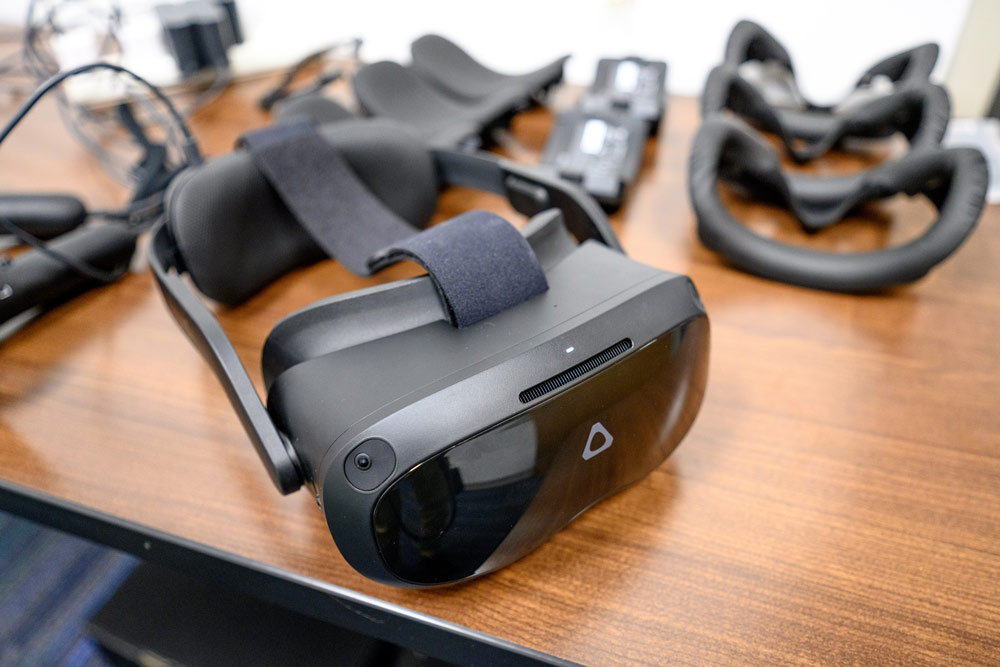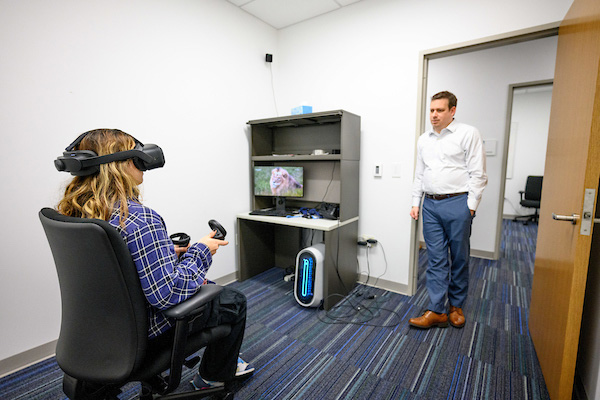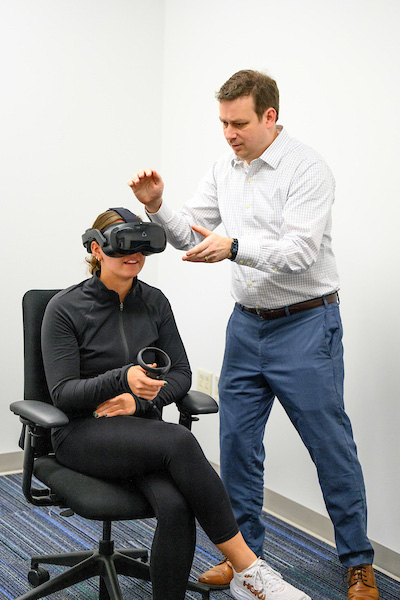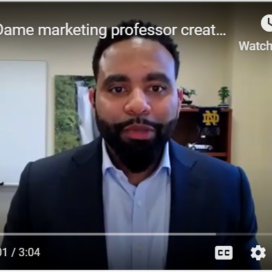Virtual reality providing opportunity to break traditional confines of teaching and research
Published: April 21, 2023 / Author: Courtney Ryan

One of the many challenges that researchers often face is drawing strong conclusions from archival data.
“We can’t really talk about what it’s like when we have a board made up of 50% women when, in practice, we don’t have enough firms that have women making up half of their board,” said Tim Hubbard, who studies how cognitive and social factors such as gender and diversity influence strategic leadership.

Timothy Hubbard
Instead of relying on more traditional methods of research, he has discovered a new world of possibilities by leveraging experimental virtual reality (VR) in his lab work and classroom.
Hubbard, an assistant professor of strategic management and Donnelly Fellow of Participatory Management at the Mendoza College of Business, is co-director of the University of Notre Dame’s Virtual Reality Lab alongside assistant professors of psychology Mike Villano and Nathan Rose.
“Where VR becomes really powerful is the ability to take somebody to a place that we couldn’t normally in a lab,” said Hubbard. Through this medium, the lab has studied how close people of different races are willing to let others get to them; how sufferers of acrophobia, or fear of heights, respond to changing environments; and how remote teams can work more creatively together.
For Hubbard’s students, VR allows them to experience first-hand what it’s like to make decisions as a CEO. In his strategic management class, students run through a simulation where they must make quick decisions and then explain their thinking to a board before being questioned by a hostile reporter in a TV studio. “These are undergraduate and masters students. They’re not CEOs and they’re not going to be for at least a few years,” he said. “But now, instead of just reading case studies about being a CEO, they have from the first day of class at least a taste of what a simulated few days as a chief executive officer could be like.”

Professor Tim Hubbard instructs a student in the VR lab.
Hubbard’s research on the potential benefits of using VR to teach management science has been published by the Academy of Management Discoveries and is forthcoming in Research Methodology in Strategy and Management. The wide breadth of possibilities available with VR has also led to unique partnerships outside of Mendoza, including with the University’s psychology department and Office of Digital Learning as well as with the University of Chicago’s Mindworks lab.
“There’s only a handful of us doing this around the world,” said Hubbard, adding that it’s important to build a community familiar with using VR to review research papers. “We need to build a community of scholars who understand the method and can review these papers. They need to have put the headsets on and have a sense of what an immersive experience it can be. Time in a headset with the type of work we are doing can overcome even the most skeptical, who think these studies are gamified or cartoonish.”
A major step in building this community will occur this summer with the first annual meeting of the Global XR Management Community hosted by the INSEAD Middle East Campus in Abu Dhabi, United Arab Emirates.
“This will be the first meeting like this in the world and will be split between one day of teaching and one day of research,” said Hubbard. “The focus is going to be on trying to get people who are teaching with VR to learn how to do research with it and people who are researching with it to learn how to teach so that we can enhance the capabilities for everybody who’s coming.”
While Hubbard is extremely optimistic about the future of VR in academia, he’s also realistic about the challenges to implement it. The realism of the simulations, for example, can be costly and time consuming to develop. “These headsets have high resolution. It’s a different level than what people see advertised on TV for video games,” he explained. “These avatars have wrinkles on their faces, you can see the stubble of a beard, they make eye contact with you. We use Hollywood-like motion capture in order to get realistic animations. But that requires a heavy processing power and so we have high-end PCs that are running these simulations and we’re only running one participant at a time.”

Professor Tim Hubbard assists a student using VR in the classroom.
The access and ease of using the technology is improving, however. More individuals are purchasing high-end headsets for use in their homes, which could mean uploading the simulations to the cloud and running studies remotely. There are also a few studies using “off-the-shelf software” and don’t require a custom-built simulation.
Ultimately, though, Hubbard argues that VR is uniquely capable of gathering empirical data on phenomena that is either difficult or impossible to study using traditional methods. Most studies on gender dynamics in the boardroom, for example, draw from measures that can only be observed outside the boardroom since access is limited.
Hubbard pointed out that some of the effects observed could be due to good governance since firms with strong governance practices are more likely to have women and racial minorities in their boardrooms. Likewise, poor decisions made by a company with fewer women involved might be due to bad governance as opposed to lack of diversity.
“There’s all kinds of corrections that scientists do to try to adjust for this,” he said. “In our case, we randomly assign these as experimental conditions so we can see truly exogenous effects. If you increase the number of women, you see this, if you decrease the number of women, you see that, and there’s no other explanation for it. So we get true causation and can show how women in boardrooms cause different decisions. And that’s revolutionary.”
Hubbard’s research appears in the Academy of Management Journal, the Strategic Management Journal, the Journal of Management Studies, the Academy of Management Discoveries, and the Fordham Environmental Law Review. He has received numerous awards such as the AMJ Best Reviewer Award and the James Dincolo Teaching Award. He serves on the Editorial Board for the Strategic Management Journal and Academy of Management Journal.
Related Stories




